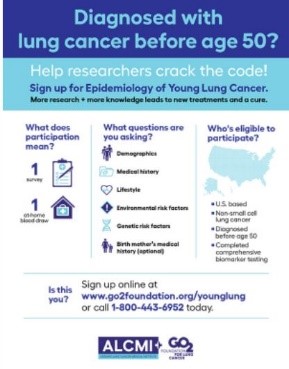
“It took a total of about eight months, four or five doctors visits and multiple X-rays to eventually get that stage IV diagnosis.” -Stephen Huff, lung cancer survivor diagnosed at age 28
When you think about diseases impacting young people, lung cancer might not be at the top of your list. But the reality might surprise you. An increasing number of young people are being diagnosed with lung cancer without explanation.
What makes it even worse is that lung cancer is not often suspected among a younger population, especially those without known risk factors, making it hard to diagnose and treat in early stages. In the Genomics of Young Lung Cancer study, nearly 79% of participants diagnosed with lung cancer before age 40 had stage IV disease at diagnosis—likely because they were perceived to be young and otherwise healthy. Lung cancer wasn’t on the radar.
Early diagnosis could drastically improve outcomes among the young lung cancer patient population—but we need to better understand what unique risk factors to look out for. For that reason, GO2 for Lung Cancer, in partnership with the Addario Lung Cancer Medical Institute (ALCMI) and leading academic centers, launched the Epidemiology of Young Lung Cancer study.
Who can help crack the code on young lung cancer?
We need more research on exposures and risk factors among the young lung cancer population. This will help people get diagnosed at earlier stages when the disease is more treatable. The Epidemiology of Young Lung Cancer study is open to people who:
- Were diagnosed with non-small cell lung cancer before age 50*
- Have completed comprehensive biomarker testing
- Live in the United States
*As of March 2022, the age criteria has increased to age 50 (previously 40). This opens the door to learn from an even greater population of young people impacted by lung cancer.
How does the study work?
Study participants are asked to fill out a confidential online survey capturing information about demographics, medical history, active and passive smoking history, early life exposures and more. Participants will also be asked to provide a small sample of blood, which can conveniently be collected at their home or through their provider.
What happens next?
Researchers and clinicians will study the data collected through the Epidemiology of Young Lung Cancer study to look for common factors and publish their findings. We hope that the study will begin to provide answers that can lead to improved prevention, detection and treatment of disease in this young lung cancer patient population. Important research happening now can change the future of lung cancer for generations to come.
If you were diagnosed with non-small cell lung cancer before age 50, click here or call 888-443-6952 to learn more about the study and how to join today.


Leave A Comment